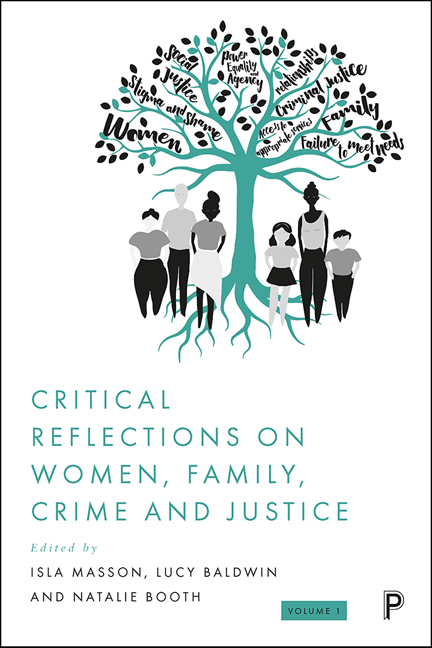Book contents
- Frontmatter
- Contents
- List of figures
- Notes on the contributors
- Acknowledgements
- Foreword: critical reflections from the Women, Family, Crime and Justice network
- 1 Starting the conversation: an introduction to the Women, Family, Crime and Justice network
- 2 Playing the game: women and community punishment
- 3 Harmful social and cultural practices that exist within South Asian communities in the UK and their impact on women
- 4 Exploring shame, love and healing within women’s recovery: an analysis of a trauma-specific intervention
- 5 Reducing the enduring harm of short terms of imprisonment
- 6 ‘Without it you’re lost’: examining the role and challenges of family engagement services in prisons
- 7 What are the challenges and opportunities for schools in supporting children of people in prison?
- 8 Impact and engagement work in the context of families of people in prison
- 9 Presence, voice and reflexivity in feminist and creative research: a personal and professional reflection
- 10 Service users being used: thoughts to the research community
- 11 Continuing the conversation: reflections from the Women, Family, Crime and Justice network
- Index
9 - Presence, voice and reflexivity in feminist and creative research: a personal and professional reflection
Published online by Cambridge University Press: 21 December 2021
- Frontmatter
- Contents
- List of figures
- Notes on the contributors
- Acknowledgements
- Foreword: critical reflections from the Women, Family, Crime and Justice network
- 1 Starting the conversation: an introduction to the Women, Family, Crime and Justice network
- 2 Playing the game: women and community punishment
- 3 Harmful social and cultural practices that exist within South Asian communities in the UK and their impact on women
- 4 Exploring shame, love and healing within women’s recovery: an analysis of a trauma-specific intervention
- 5 Reducing the enduring harm of short terms of imprisonment
- 6 ‘Without it you’re lost’: examining the role and challenges of family engagement services in prisons
- 7 What are the challenges and opportunities for schools in supporting children of people in prison?
- 8 Impact and engagement work in the context of families of people in prison
- 9 Presence, voice and reflexivity in feminist and creative research: a personal and professional reflection
- 10 Service users being used: thoughts to the research community
- 11 Continuing the conversation: reflections from the Women, Family, Crime and Justice network
- Index
Summary
Introduction
This chapter extends a presentation given by the author during the 2019 Women, Family, Crime and Justice seminar series. This was a reflexive presentation incorporating both personal and professional reflection and experience. Exploring reflexivity and creative research through a personal and professional lens, the chapter alternates between the first person and the third person, where appropriate.
The chapter first sets out what is understood by feminist research, emphasising that it is more than simply research undertaken by researchers who consider themselves feminist, but research informed by broader feminist principles via its topic, design, process, analysis and researcher reflexivity. Critically, feminist research advocates for the presence and voice of participants, and the reflexivity of the researcher to be visible in the final products of research (Maynard and Purvis, 1994; Oakley, 2016).
Thereafter, there is a reflective discussion about my doctoral research (Baldwin, forthcoming) and research process, notably how mothers themselves assisted in shaping the research decisions, research tools and the methodology (for example, where the interviews took place). It then explores the researcher/research relationship and its significance. The final section presents the author's recent research project (jointly undertaken with Ben Raikes), which sought to generate knowledge and understanding about parental imprisonment. The project concluded with the production of a published collection of poetry. We posit that the collection constitutes a form of research that has produced a significant body of knowledge (see later discussion), and one which reveals much about the impact of parental imprisonment. Importantly, and in line with feminist principles (Doucet and Mauthner, 2006), the project saw the participants’ words presented undiluted, in an accessible format, and via an inclusive project in which the participants/poets were able to retain power and control in the research process.
What is meant by ‘feminist research’?
Historically, defining ‘feminist research’ has proved challenging, even to the point of reaching a consensus that feminist research has a distinct and separate identity (Gelsthorpe, 1990; Letherby, 2004). Gelsthorpe (1990, p 105) suggests it is often difficult to differentiate between feminist research and ‘good’ research, asking if feminist research is simply ‘old wine in new bottles?’. Merriam (1988) similarly argued that feminist researchers simply employed good practice concerning their research design and methodology.
- Type
- Chapter
- Information
- Critical Reflections on Women, Family, Crime and Justice , pp. 173 - 198Publisher: Bristol University PressPrint publication year: 2021



